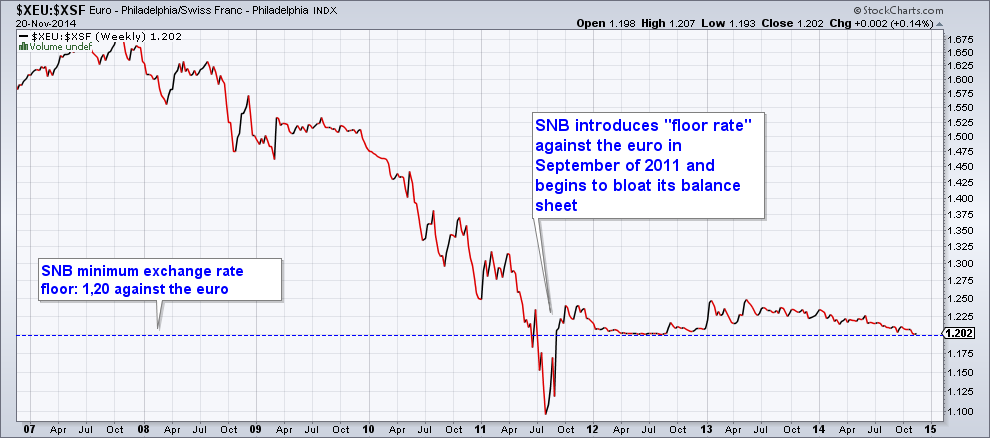The famous Austrian economist Keith Weiner and implicitly the Wall-street Journal argue that the SNB must keep the euro over 1.20 in order to maintain stability in the Swiss banking system. A rapid appreciation of the franc would create losses caused by reckless lending of Swiss banks.
Via his Acting man Blog:
A Key Flaw
There is now a very interesting initiative on the Swiss ballot, which will require the Swiss National Bank (SNB) to hold 20 percent of its reserves in Gold. The voters will decide on November 30. I won’t predict the vote, but I want to discuss the likely impact of a yes vote.
Much of the analysis of this initiative is about the price of gold. A typical prediction is that it will go up, as SNB buying will exceed supply. However Mike Shedlock notes that, “Nearly all of the gold ever mined is available…”
That’s because gold is not consumed. The SNB is small compared to worldwide gold inventories, so it won’t move the price much. Shedlock adds, “It is entirely possible that SNB purchases could significantly alter perceptions…” I agree sentiment is ripe for a change.
The price isn’t very interesting, unless you’re a gold trader. It’s much more important that the referendum brings the first positive monetary change in decades. It reintroduces a link between gold and banking, and imposes a barrier to currency debasement. For this, the Swiss are heroes.
There is a key flaw in our system of floating currencies. Every financial asset is someone’s liability. When a currency moves, it creates winners and losers. Big moves can harm banks with loan portfolios outside their home.
That’s why the SNB currently doesn’t allow the euro to fall below 1.2 francs. To maintain this currency peg, the central bank sells francs and buys euros. There is no limit to this deliberate franc devaluation, which robs Swiss savers, investors, and businesses.
Big exporters, like Swatch SIX:UHR) and Nestle N (SIX:NESN), may have lobbied for a weaker franc, hoping to make their products more competitive, but that’s a sideshow.
After that “sideshow”, about which I often complained, for example in
Swiss Exports Rise Thanks to Higher Export Prices. Sorry, What ????
Keith continues:
The real purpose of franc devaluation is to shield the Swiss banks from euro devaluation.
They’re vulnerable, because they do a lot of lending outside the country. They have assets denominated in euros and liabilities denominated in francs. They suffer losses when the euro falls, or the franc rises.
Two examples help illustrate the problem. First, say Jens in Germany borrows a million euros from Credit Suisse. As the euro falls, Jens repays the bank in smaller and smaller euros. On the franc-denominated books of Credit Suisse, the value of the loan drops like a stone. Jens is happy but Credit Suisse is not.
Second, let’s look at Adriana in Italy who also borrows money, but not in euros. She gets a million francs from UBS (SIX:UBSN). As the euro falls, Adriana experiences it as a rising franc. Her monthly payment goes up and up. UBS is happy, at least initially, because Adrian’s loan is in francs. However Adriana is getting squeezed. When she defaults, then UBS becomes unhappier than Credit Suisse (SIX:CSGN).
The same opinion comes from the Wall Street journal and we cited this risk in “The Risks of the Rising SNB Money Supply“.
It explained why M3 growth suddenly slowed down.
We wrote in our snbchf blog:
“The second risk does not directly concerns the Swiss economy and the euro, but the relationship between its banks and emerging markets and the risks of a strong franc for the balance sheets of Swiss banks”
From the Wall Street Journal on Credit Suisse:
Much of this new money is from Asia and other emerging markets. One of the things attracting these clients is Credit Suisse’s willingness to make large loans to the ultrawealthy. Such loans have grown by CHF3.9 billion over the first nine months of this year versus CHF1 billion in the same part of 2013. They are often backed by the borrower’s illiquid wealth in the form of equity in their companies, for example, or warrants for future ownership.
Such lending can be hugely profitable. Yet any investor who has seen more than one cycle in countries such as Indonesia knows it can also be quite risky. (source WSJ)
We continue with Keith’ arguments:
A Better Option
Either way, the capital of the Swiss banks is eroding. If the euro falls enough, then the banks could go bust. Only they know where the line is, but it’s likely not too far below the current peg of 1.2 francs.
Depositors won’t feel the currency pain, at first. They are happy to own Swiss francs, especially if the franc is rising. Instead, they should worry about the unintended consequences of breaking the euro peg. Their strong francs will not be good in the case of bank insolvency.
Unfortunately the regime of paper money imposes a bitter dilemma on the Swiss people. They have a choice of slow losses by devaluation, or total losses by bankruptcy. They deserve a better option, a practical road map to the gold standard.
It’s great that the Swiss people are striving to move towards gold. I am a passionate advocate of the gold standard, and I want to cheer for my Swiss friends. Yet I must caution them today.
I realize they have spent a lot of money and political capital to come so far, but I don’t want to win this battle and lose the war. They need a new initiative, which takes into account the banks’ euro-denominated loans.

